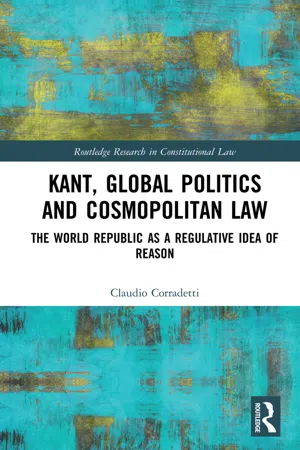
Kant, Global Politics and Cosmopolitan Law
The World Republic as a Regulative Idea of Reason
- 222 pages
- English
- ePUB (mobile friendly)
- Available on iOS & Android
Kant, Global Politics and Cosmopolitan Law
The World Republic as a Regulative Idea of Reason
About This Book
Why is there so much attention on Kant's global politics in present day law and philosophy? This book highlights the potential fruitfulness of Kant's cosmopolitan thought for understanding the complexities of the contemporary political world. It adopts a double methodological strategy by reconstructing a genealogical conceptual journey showing the development of international law, as well as introducing an interpretation of cosmopolitanism centred on Kant's theory of a metaphysics of freedom. The result is a novel focus on Kant's notion of the world republic. The hypothesis here defended is that the world republic stands as a way of thinking about international politics where the possibility of progression towards peace results from its use as a regulative idea.
Frequently asked questions
Part 1
Kant and the legacy of modernity
§ 1
From universal monarchy to global authority
Table of contents
- Cover
- Half Title
- Series Page
- Title Page
- Copyright Page
- Dedication Page
- Contents
- Acknowledgments
- Method of citation of Kant’s works
- Introduction
- PART 1 Kant and the legacy of modernity
- PART 2 ant’s critique of just war theory and colonialism
- PART 3 Theory and practice: the world (state) republic as a regulative idea of reason
- PART 4 Juridical constructivism and the cosmopolitan constitution
- Conclusion
- References
- Analytic index